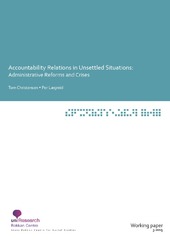| dc.contributor.author | Christensen, Tom | |
| dc.contributor.author | Lægreid, Per | |
| dc.date.accessioned | 2018-01-11T10:18:46Z | |
| dc.date.accessioned | 2020-12-10T06:24:44Z | |
| dc.date.available | 2018-01-11T10:18:46Z | |
| dc.date.available | 2020-12-10T06:24:44Z | |
| dc.date.issued | 2015-07 | |
| dc.identifier.issn | 1503-0946 | |
| dc.identifier.uri | https://hdl.handle.net/1956/17184 | |
| dc.description.abstract | This paper examines what characterizes accountability relationships in the unsettled situations that arise during reforms or crisis management. We look at how accountability is handled in circumstances that go beyond «business as usual». By way of illustration we take the post‐2005 reforms of the Norwegian welfare administration and the crisis management following the terrorist attack in 2011. In theoretical terms we argue that we have to go beyond a principal‐agent approach and must instead apply a broad institutional perspective to understand how accountability plays out in such situations. Our main findings are that accountability relations in unsettled situations are multiple because the challenges they face are ambiguous, complex, dynamic and conflicting. | en_US |
| dc.language.iso | eng | eng |
| dc.publisher | Stein Rokkan Centre for Social Studies | eng |
| dc.relation.ispartofseries | Working paper; 3-2015 | eng |
| dc.title | Accountability Relations in Unsettled Situations: Administrative Reforms and Crises | eng |
| dc.type | Working paper | eng |
| dc.rights.holder | Copyright Stein Rokkan Centre for Social Studies. All rights reserved. | eng |
| dc.description.version | publishedVersion | |
